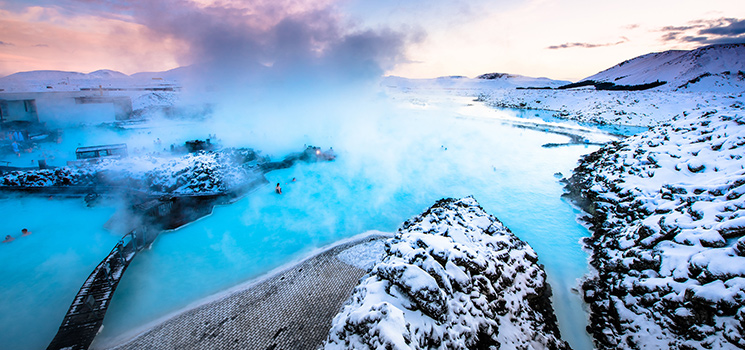Iceland's tourism has exploded during the past decade: In 2010, after a financial crisis and devastating volcanic eruption, 500,000 tourists visited the Nordic island nation. Now, it welcomes more than 2 million visitors annually.
Why the massive growth? Word spread fast of Iceland’s natural wonders, from its volcanic landscapes and geysers to hot springs and glaciers. It’s the perfect setting for the social media age, not to mention one of the most welcoming countries on Earth, despite its isolation.
Iceland Quick Facts
- Population: 338,349 (2017)
- Area of about 40,000 square miles, roughly the same size as Kentucky
- Viking settlers arrived on the island in the late ninth century
- In 2018, Iceland became the smallest nation ever, in terms of population, to compete in the FIFA World Cup.
- Ranked first in the Vision of Humanity’s Global Peace Index and in gender equality, according to the World Economic Forum Global Gender Gap Report
- Home nation of 2018 World’s Strongest Man Hafþór Júlíus Björnsson, Gregor “The Mountain” Clegane from HBO's Game of Thrones, as well as musician Björk, and bands Of Monsters and Men, and Sigur Rós
If you’re planning a vacation to the so-called "Land of Fire and Ice," nicknamed for the aforementioned volcanoes and glaciers, make sure to add these activities to your itinerary. Keep in mind, however, public transportation is limited outside of Reykjavik, so renting a car is your best bet to get around.
Learn These Icelandic Phrases
Icelanders, like all Scandinavians, tend to speak English very well. They also happen to be friendly and quite content—Iceland ranked as the fourth-happiest country in the world in 2019. It doesn’t hurt to show appreciation for the local language, though. Just maybe don’t ask about the bus station: Umferðarmiðstöð.
- Good Day — Góðan dag (ð pronounced as ‘th’ sound in weather)
- Goodbye — Bless
- Yes — Ja
- No — Nei
- Please — Vinsamlegast
- Thank you very much — Takk fyrir
- What is your name? — Hvað heitir þú?
- One beer, please — Ein bjór, takk
Taste The Local Cuisine
A trip through an Icelandic menu is a vacation in and of itself. Hákarl, fermented shark, is the national dish of Iceland, although it’s not widely consumed anymore. It has a pungent smell, but has been compared to a strong cheese in both taste and texture. Other “exotic” foods include boiled or smoked puffin, sheep’s head (yes, it’s literal), and harðfiskur (essentially fish jerky). Wash it all down with brennivín, a clear schnapps liquor known colloquially as Black Death for its potency.
Restaurants in Reykjavik
Grillmarkaðurinn: Top Icelandic chefs cook up a range of meats and fish, as well as dishes unique to the island, including whale steaks and reindeer burgers.
Fiskfelagid: This seafood restaurant located in the historic Zimsen building features local and international favorites.
Cafe Loki: Stop in before or after visiting Hallgrímskirkja—the famed church is right across the street—for traditional Iceland food in a comfortable, modern setting.
Enjoy Nightlife in Reykjavik
Reykjavik is known for its great nightlife. Bar-hopping is easy, hours are late (especially during the midnight sun season), and cover charges are virtually nonexistent. Bars of all types line Laugavegur, one of the capital’s main roads, from dance cafes and speakeasies to establishments with Western influences: Lebowski Bar or Chuck Norris Grill, anyone?
Swim in the Blue Lagoon
As if a healing, 102-degree, all-year-round spa wasn’t spectacular on its own, the uber-popular Blue Lagoon is often elevated by the elements around it. In the winter, snowfall adds a surreal effect to relaxation. Also, should bathers get lucky, there are few better settings to view the Northern Lights. The Blue Lagoon’s proximity to Keflavík International Airport—about a 15-minute drive—makes it an ideal bookend to your vacation, but you’ll have to reserve your slot beforehand.
Visit the Westfjords
Even by Icelandic standards, the Westfjords region is remote. It’s a long drive from Reykjavik—about six hours, depending on your destination—and only accessible in the summer, due to heavy snowfall. Yet the payoff is worth it for those who make the trek, especially wildlife lovers. The Látrabjarg cliffs, a haven for puffins and other seabirds, offer some of the best bird-watching in Europe. Seals dot the beaches, while humpback whales, white-beaked dolphins, and the occasional orca call the waters around the peninsula home. Arctic foxes, elusive and camouflaged in other parts of Iceland, are abundant in the Hornstrandir Nature Reserve.
Other Must-See Sites
Hallgrímskirkja: At 244 feet, this church, the tallest building in Reykjavik, rises spectacularly above the city, with architecture equal parts futuristic, out-of-this-world, and uniquely Icelandic.
The Golden Circle: The 186-mile loop encircles Iceland’s most famous natural wonders, including the Geysir geothermal area, Gullfoss waterfall, and Þingvellir National Park.
Skaftafell: Ice caves, glaciers, hiking, and breathtaking scenery provide visitors with an experience that only a country as unique in geology as Iceland can deliver.




